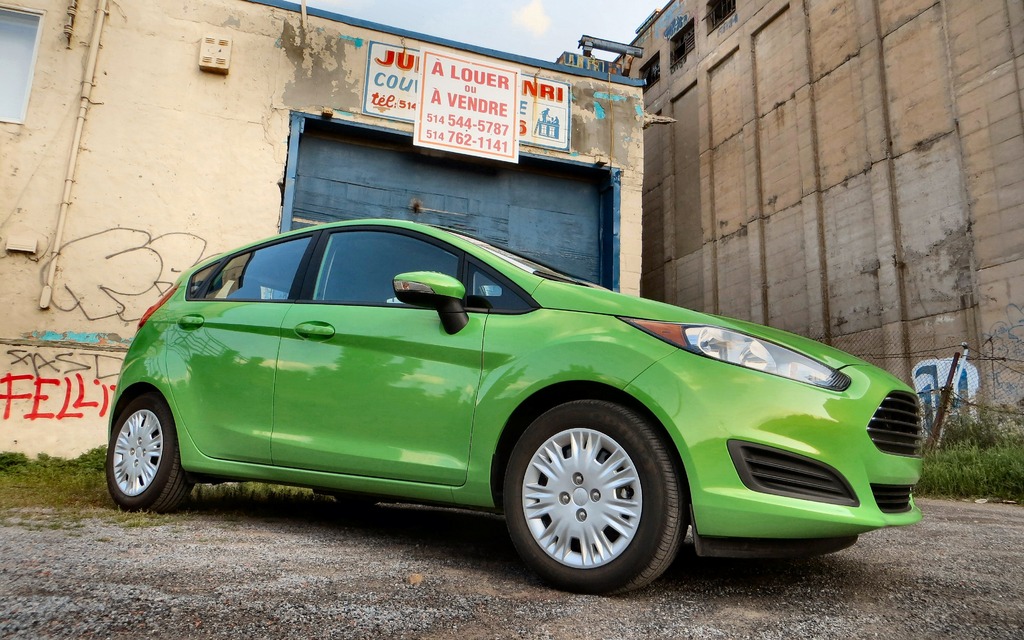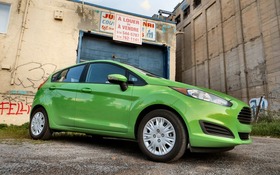2014 Ford Fiesta SFE EcoBoost: Don't Pay More For Less

| Strong points |
|
|---|---|
| Weak points |
|
The 2014 Ford Fiesta SFE EcoBoost hatchback is the unusual child of technology and regulations, mid-wived into this world by way of the increasing public desire for ultra-efficient small cars. Proof that the Fiesta SFE EcoBoost exists almost exclusively to lower Ford's corporate average fuel economy (CAFE) isn't hard to find: to order this car's frugal drivetrain you have to dig for it in the Fiesta SE's options list, where it hides as the 'SE Manual EcoBoost Package' under the 'Exterior Packages' section. There's no banner on the Ford website to click and buy this version of the Fiesta, nor is it presented as its own unique model when browsing through the car's trim levels. You have to know exactly what to look for to order this particular turbocharged Ford.
After having spent a week behind the wheel of the 2014 Ford Fiesta SFE EcoBoost, I can understand why the automaker has transformed the car's buying process into somewhat of a treasure hunt. There's not a lot to recommend the Fiesta SFE EcoBoost over the already-excellent base Fiesta, and certainly no reason to spend $1,500 extra on top of the SE model's $16,749 MSRP to swap out the hatchback's naturally-aspirated four-cylinder motor for the EcoBoosted three-cylinder unit.
On-Paper Promises
Yes, that's right - the 2014 Ford Fiesta SFE EcoBoost only offers three cylinders for your driving pleasure, with a total displacement of one litre. Thanks to the presence of Ford's EcoBoost turbocharging system, the smallest engine on the Canadian market (matched only by the much weaker unit found in the Smart Fortwo) generates what at first would seem to be a class-competitive 123 horsepower and 125 lb-ft of torque. There's an overboost function lurking in there, too, that will deliver 145 lb-ft for a maximum of 15 seconds. Indeed, these numbers crest those offered by the entry-level Fiesta's 1.6-litre four-cylinder motor, although not by much (120 horses and 112 lb-ft of twist). Ford also promises better fuel efficiency for the EcoBoost one-litre, boasting 6.2 l/100 km around town and 4.3 l/100 km on the highway.
Real-World Letdown
With such an optimistic appraisal of the Fiesta SFE EcoBoost's capabilities, what, exactly, rubbed me the wrong way about the car once the rubber met the road? There are several aspects of the 1.0-litre, three-cylinder drivetrain in the turbocharged Ford that I found disappointing in daily use. For example, the EcoBoost drivetrain comes exclusively with a five-speed manual transmission that seemed mismatched to the slow-revving engine's power band. I almost always felt as though I was hovering one ratio above where I actually needed to be, which led to constant shifting to prevent the Fiesta SFE EcoBoost from shuddering at low RPM. The top cog was essentially unusable at speeds below 100 kilometres an hour, which meant I had to gear down on the highway as soon as I dropped even a little bit of speed to ensure that I could match the pace of traffic around me.
As for the overboost function, one has to work the three-cylinder engine very hard indeed to even get it close to its redline, let alone access what extra torque might be lurking in its upper reaches. Starting the Fiesta on a hill incurred a shaking protest from the three-cylinder engine, coupled with a general harshness and an unusually loud engine note regardless of how quickly the car was travelling. I found it difficult to drive the SFE EcoBoost smoothly, especially if there were any elevation changes to be found between my destination and point of origin.
There must be some kind of efficiency payoff for enduring the unpleasant character of the Ford, right? After all, the improved fuel economy figures are right there on the window sticker. Unfortunately, during my 300 kilometres with the car they never made the leap from the sticker to the fuel pump as I saw a combined 8.1 l/100 km during a balance of both highway and city driving. Again, it's not hard to understand the disconnect: as mentioned above you've really got to wring the three-cylinder motor to even keep up with the flow of traffic, which isn't a situation where you'll maximize distance-per-tank.
Stick With The 1.6-litre Fiesta
The 2014 Ford Fiesta SFE EcoBoost was a disappointing drive not just because of the failings listed above, but also because the standard Fiesta is so very, very good. In fact, the 1.6-litre Fiesta is one of my favourite subcompact cars to drive, and its remains a far better value than the EcoBoost model in terms of price, performance, and efficiency. With a character that's much easier to live with, particularly in terms of power delivery, the 1.6-litre motor shines over and above anything the SFE EcoBoost has to offer. Although the three-cylinder edition of the Fiesta isn't an outright terrible vehicle, it's certainly a less appealing iteration of what was already a competitive small car option. In this case, there's really no reason to pay more for less.











